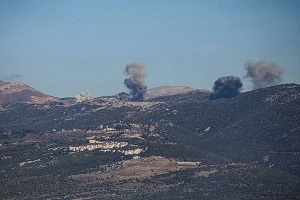Israel’s Gaza war shows Lapid’s true colors - By Ben Lynfield, Jordan News
The mainstream Israeli media and allies of Yair Lapid, the caretaker prime minister, were quick to declare Israel’s three-day asymmetrical war against Palestinian Islamic Jihad in Gaza a resounding success.
But the truth is that this unwarranted round of fighting, from August 5 to 7, not only killed dozens of Palestinians, it left behind dangerous implications for the region as a whole and Israel itself.
Lapid, who took over recently from Naftali Bennet and hopes to be elected premier in November, has for years been criticized by his rival, the former prime minister Benjamin Netanyahu, for lacking the experience needed to manage security threats.
The war, according to Galia Golan, emeritus professor of political science at Hebrew University, allowed Lapid to burnish his security credentials.
“There was no reason this war should have taken place except to give Lapid a chance to show he is willing to fight,” Golan said.
Islamic Jihad is a smaller faction than Hamas, the militant group that rules the Gaza Strip. Both groups believe that all the area between the Jordan River and Mediterranean Sea is Islamic territory and that Israel should be destroyed. Israel has fought frequent wars with the Palestinian factions ever since Hamas gained control of Gaza in 2006. Since then, Israel’s devastating bombardments have killed thousands and reduced large areas to rubble, while a blockade of the territory has crippled its economy. Palestinian rocket attacks have accounted for most of the more than 100 Israeli fatalities. Both sides have drawn criticism from the international community and human rights groups.
The latest three days of fighting killed 49 Palestinians, mostly civilians, including 17 children, according to the Gaza health ministry. Some 360 people were injured. Some of the Palestinian deaths came from Islamic Jihad’s rockets falling short or misfiring. More than 40 Israelis were lightly injured.
In addition to the harrowing human toll, there were three particularly alarming aspects of this war in terms of the direction of the broader conflict. Firstly, to modify the famous adage of German strategist Carl von Clausewitz that war is the continuation of politics by other means, this war was the continuation of Israel’s endless cycle of electoral politics. Secondly, the conflict showed that Lapid, if he is elected, will be no more dovish than his predecessors despite being depicted as a centrist. And thirdly, that Israeli society and media, with the notable exception of a vanishing left wing, a handful of pressure groups and Haaretz newspaper, lack the capacity or desire to engage in critical thinking when it comes to military affairs. This is dangerous for the future of one of the world’s longest running conflicts.
“The propaganda machinery worked very well,” said Menachem Klein, emeritus professor of political science at Bar Ilan University.
“There was 24/7 coverage. The stations interviewed ex-generals who gave the official line. They were slow to show Palestinian casualties inflicted by the army, but when Islamic Jihad rockets failed and killed Palestinians, they showed them immediately.”
No Israelis were killed, boosting a manufactured sense of victory. Typical of the pro-Lapid and pro-army chorus was a column by Jerusalem Post editor Yaacov Katz, who wrote: “By almost every metric, the three-day operation called Breaking Dawn was a success. Targets were chosen carefully and struck surgically.”
He added that the Iron Dome missile shield had intercepted 96 percent of Islamic Jihad’s rockets.
Moreover, Lapid had been astute in not drawing Hamas into the fighting and stopping the bombardments after three days, in contrast to protracted previous rounds, Israeli media outlets stressed. Hamas is believed to have stayed out in part to not jeopardize the measured economic gains for Gaza that came from Israel’s recent decision to allow thousands of Gazan workers into Israel.
Despite the US and Britain proclaiming support for Israeli self defense, the issue of whether there was any legitimate reason for Israel to go to war is very much in the eye of the beholder.
Now we know that Lapid appears willing to play with the lives of Arabs and even Israelis (had more Islamic Jihad rockets got through) for political self interest. Furthermore it is now apparent that Israel’s ever increasing
On August 1, Israel arrested West Bank Islamic Jihad leader Bassam Saadi in Jenin. Citing intelligence that the group was planning retaliatory fire at Israeli targets near the Gaza border, Israel, having put border communities under strictures, launched what it termed a “pre-emptive strike” by assassinating Tayseer Jaabari, the commander of Islamic Jihad in the northern Gaza Strip. It did this in the full knowledge this would escalate the conflict into a war and trigger the firing of hundreds of Islamic Jihad rockets toward Israel.
Thus Lapid, counting on the Iron Dome, put Israelis at risk for a limited tactical gain. As Klein notes, assassinated Islamic Jihad and Hamas leaders are replaceable. The scholar does not think that assassinations have much long-term impact on these groups.
“There is no strategic thinking, it is operational and tactical thinking,” Klein said of Israel’s approach.
Those projecting the war as a victory also held up the assassination of Khaled Mansour, Islamic Jihad’s commander in the southern Gaza Strip, as evidence. But Klein differed.
“With this round ending, we return to the same situation as before,” he said.
But perhaps we are actually wiser now. Now we know that Lapid appears willing to play with the lives of Arabs and even Israelis (had more Islamic Jihad rockets got through) for political self interest. Furthermore it is now apparent that Israel’s ever increasing technological prowess – as shown in the Iron Dome – makes it more rather than less prone to engage in escalations that in the future may impact more broadly in the region. That could cause a wider spiral of violence with the Palestinians and enflame public opinion in the Arab world.
Ben Lynfield is the former Middle East affairs correspondent at the Jerusalem Post.
Latest News
-
 Crown Prince chairs meeting to review programme on combating littering
Crown Prince chairs meeting to review programme on combating littering
-
 King congratulates Morocco monarch on football team’s 2025 Arab Cup win
King congratulates Morocco monarch on football team’s 2025 Arab Cup win
-
 US Senator Accuses Hamas and Hezbollah of Rearming
US Senator Accuses Hamas and Hezbollah of Rearming
-
 One Dead in Israeli Strikes on South Lebanon
One Dead in Israeli Strikes on South Lebanon
-
 Putin Ready to Talk to France’s Macron on Ukraine, Says Spokesman
Putin Ready to Talk to France’s Macron on Ukraine, Says Spokesman